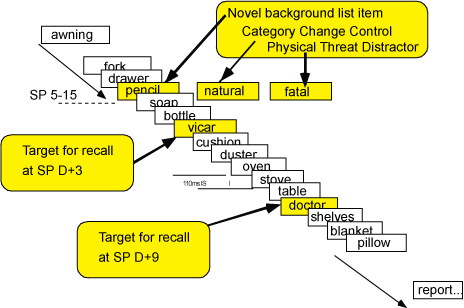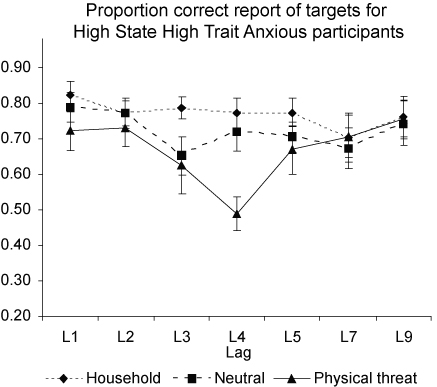Paying attention to emotional meanings
Anxiety and the deployment of attention over time
In two studies we have investigated the effects of anxiety on the time course of attention to threatening material.
A rapid serial visual presentation (rsvp) paradigm was employed based on our semantic blink paradigm. This required report of words belonging to a pre-specified semantic category with a distractor placed at varying positions preceding the target.
The distractors of interest had "threat-related" content and we recruited a sample of people who could be classified as of Low State and Low Trait Anxiety; High Trait, Low State Anxiety and High Trait High State Anxiety.

Where there was little resemblance in meaning between distractors and targets, threat distractors briefly captured the attention of high state anxious individuals but only after a delay. There were no effects with those participants with low levels of state anxiety irrespective of their evels of Trait Anxiety.

Of course, the bigger picture is more complicated...
Where distractors resembled the meaning of the targets, attention was captured more immediately, but processing of threat-related material was concentrated at different points in time as a function of both the degree of semantic resemblance between distractors and target, and state anxiety. It wasn't that anxiety caused a deeper blink - rather it altered the temporal course of attention in a way that suggested to us that, in these circumstances, high levels of state anxiety might act to occlude threat markers at an "Implicational" level of representation.
For a full report see
Barnard, P. J., Ramponi, C., Battye, G. & Mackintosh, B. (2005). Anxiety and the deployment of visual attention over time. Visual Cognition, 12, 181-211.
and for a computational model see
Su, L., Bowman, H. & Barnard, P. (2011) Glancing and then looking: on the role of body, affect and meaning in cognitive control, Front. Psychology 2:348. doi: 10.3389/fpsyg.2011.00348.

 MRC Cognition and Brain Sciences Unit
MRC Cognition and Brain Sciences Unit





